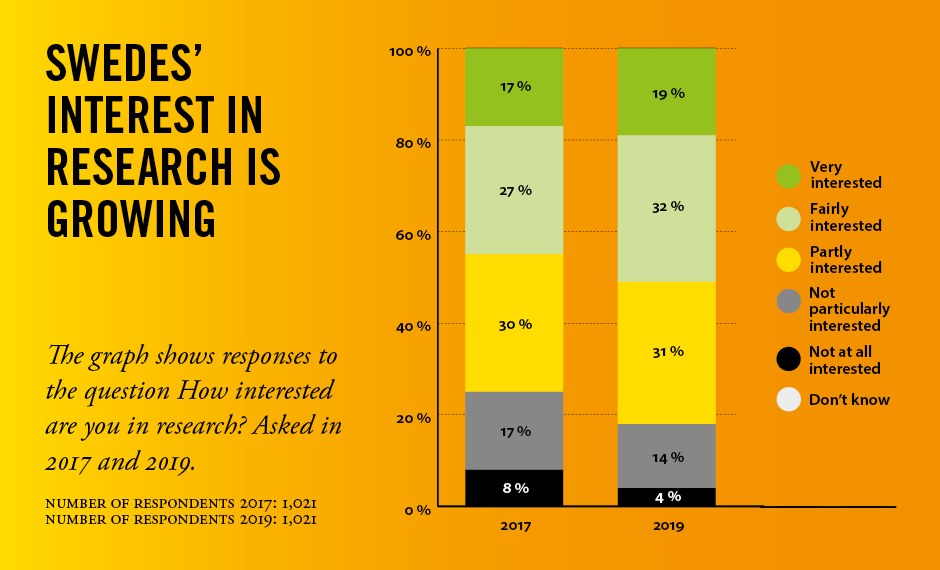Press release 4 February 2020
Fake news, knowledge resistance and alternative facts, all present challenges for science. But in Sweden, interest in research is increasing, and people’s confidence in researchers is both stable and high. These are some of the findings from this year’s annual VA Barometer conducted by the Swedish non-profit organisation VA (Public & Science).
“It is very encouraging that research is viewed as something that is interesting and reliable among Swedes, although this certainly doesn’t mean that problems such as fact resistance don’t exist in Sweden. We must continue to promote and support dialogue between researchers and other actors,” said Martin Bergman, a researcher at VA (Public & Science), who is responsible for the survey.
Every autumn since 2002, VA has been measuring the Swedish public’s attitudes to research and science. The results of this year’s VA Barometer show that research is considered more interesting than economics, politics, culture and sport. Among the respondents, 51 percent say that they are fairly or very interested in research, which is an increase compared to 2017, when the proportion was 44 percent.

However, the level of interest varies greatly between different research subjects. Swedes have the greatest interest in medicine, in which two-thirds (67 percent) are fairly or very interested. The corresponding proportion for the natural sciences is 56 percent, followed by technology (55 percent), the humanities (36 percent), the education sciences (34 percent) and the social sciences (33 percent). Some gender differences in levels of interest can also be seen.
“We don’t see any differences between men and women when we ask them about their interest in research in general, but when we go into different research subjects, views clearly start to differ,” commented Martin Bergman.
Men are more interested in research in technology, while women express a larger interest than men in medicine, the education sciences, the humanities and the social sciences.
Confidence in those that conduct the research i.e. in researchers, remains at a high and stable level. In this year’s VA Barometer, 79 percent of Swedes have fairly or very high confidence in researchers at universities.
Participants in the Barometer were also asked about their views on artificial intelligence (AI) and its future consequences. In this regard, Swedes’ hopes for the future are somewhat reserved: 32 percent believe that AI will affect us equally positively and negatively, 30 percent think more positively than negatively, while 14 percent believe more negatively than positively. Only 3 and 2 percent, respectively, believe that developments in AI will be only positive or only negative. One in five respondents (19 percent) say that they don’t know, suggesting that the consequences of AI are perceived to be difficult to predict.
Notes to Editors:
The VA Barometer has been carried out annually since 2002. The results are based on 1,021 telephone interviews with a nationally representative sample of the Swedish population aged 16–74 years. The interviews were carried out by Exquiro Market Research.
An English version of the 2019/2020 VA Barometer is available along with the questions asked in the interviews.
VA (Public and Science) is a Swedish non-profit civil society organisation that promotes dialogue and openness between researchers and the public, especially young people. The organisation works to create new forms of dialogue about research. VA is also developing new knowledge on the relationship between research and society through surveys and studies. Its members consist of some 90 organisations, authorities, companies and associations. In addition, it has a number of individual members.
For further information about the VA Barometer, please contact Martin Bergman, Researcher at VA.
